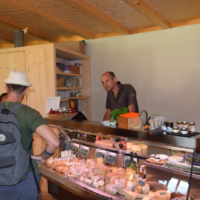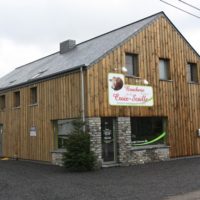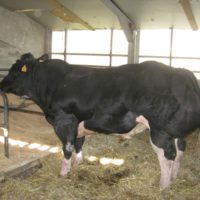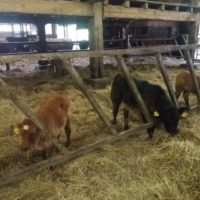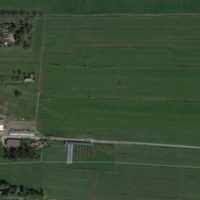Grazing management with dairy sheep in a mountain environment and regional marketing of products
Practice abstract
Description
In 2011, the farmer decided to convert to organic sheep farming because the tie stall had become too old for the cows and instead of rebuilding it, a simply and cost-effective adaption was targeted. A further reason for this change was that the steep areas in the immediate vicinity of the farm were too steep and thus too expensive for the production of forage. On these areas haymaking is nowadays no longer profitable despite the public payments, whereas grazing with small ruminants is a viable alternative.
Three paddocks are available to the 100 East Frisian dairy sheep (occasionally crossed with Lacaune). There, they can graze during the day and find shade under the existing shrubs and trees. The seasonal lambing, which begins at the end of January, reduces the work load in the winter months and allows therefore the farmer to take time off and to rest in this period. The off-farm forage purchase amounts to a total of 5,000 – 6,000 kg of maize, alfalfa and pelleted wheat bran per year only.
The sheep’s milk is processed on farm. Vegetables and potatoes are also grown on farm. The farm products are marketed through the own farm shop, local retailers and hotels in the surroundings. The cooperation with the regional tourism is close. Farm guided tours are offered to guests who can also eat at the farm’s restaurant. The aim is not only to sell customers a product, but also an experience.
As prerequisites for grazing, the existence of sufficient areas close to the farm and the learning of how to handle the animals and manage the pasture should be mentioned. In addition, particularly in the first few years, continuous oversowing is necessary in order to promote the trasnformation of meadows into pastures with a dense sward.
Abstract also available in:
Dutch | French | German | Italian | Polish | Swedish
Additional information
| Farming system | organic farming |
|---|---|
| Domains of innovation | marketing, product processing |
| Main types of animal | dairy sheep |
| Country | Italy |
| Product type | Practice abstract |
| Language | English |


